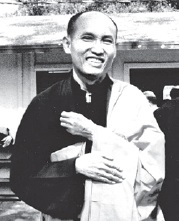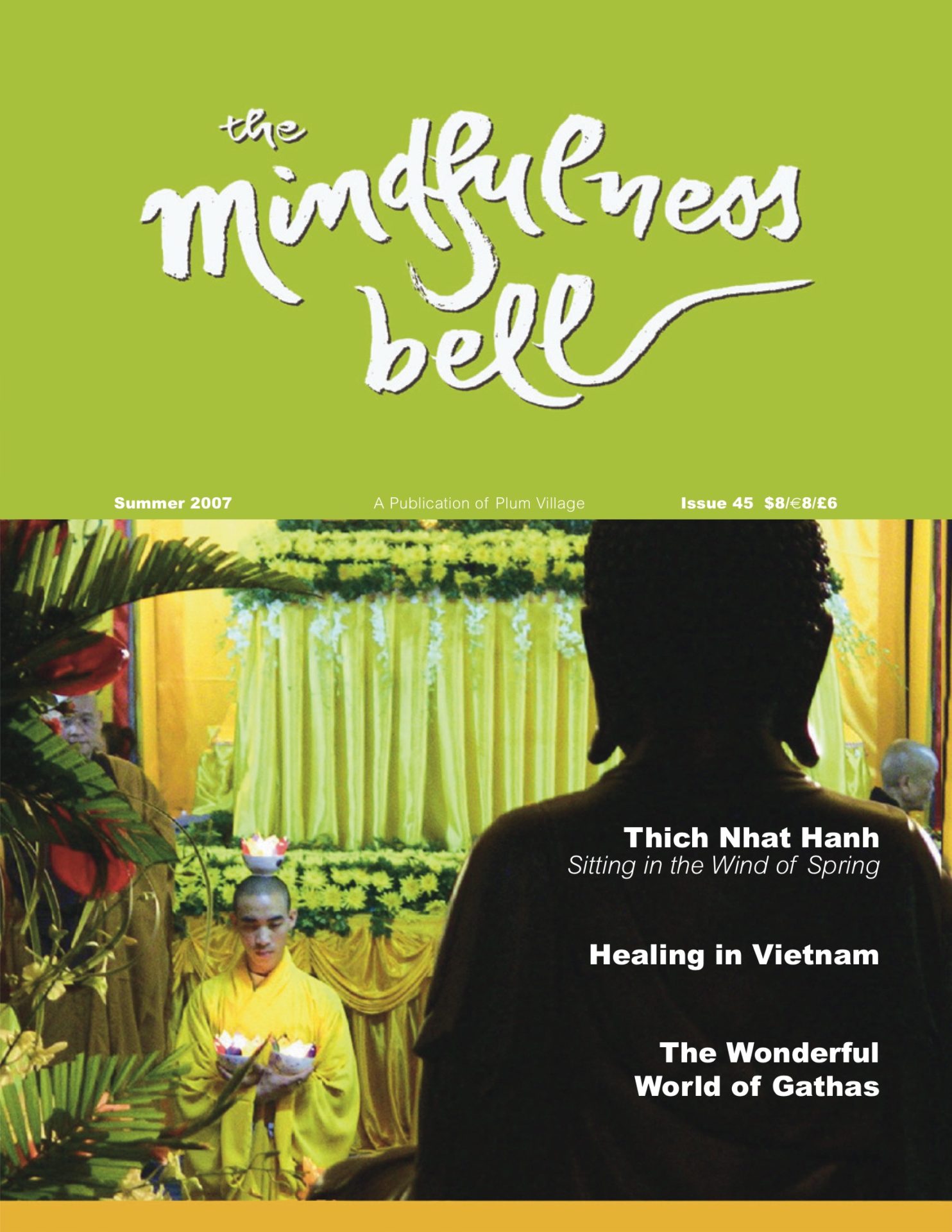
1947-2001
Last fall marked the fifth anniversary of the passing of Thay Giac Thanh, the beloved former abbot of Deer Park Monastery. In his honor a beautiful stupa was built above Solidity Hamlet, and a ceremony of dedication brought together many of those who had known and loved the gentle monk. In this special section we feature several of Thay Giac Thanh’s poems from Scattered Memories, the complete collection of his poems published in 2006 by Parallax Press and excerpted here with permission.

1947-2001
Last fall marked the fifth anniversary of the passing of Thay Giac Thanh, the beloved former abbot of Deer Park Monastery. In his honor a beautiful stupa was built above Solidity Hamlet, and a ceremony of dedication brought together many of those who had known and loved the gentle monk. In this special section we feature several of Thay Giac Thanh’s poems from Scattered Memories, the complete collection of his poems published in 2006 by Parallax Press and excerpted here with permission.
Thay Giac Thanh was born in a quiet and remote hamlet in Rach Gia Province in southern Vietnam. Eventually his family moved to Rach Gia City where he learned to read and write and became an excellent student. Thay Giac Thanh expressed love for his country in his first poem, “Tears for my Homeland,” written when he was in the twelfth grade.
He became a novice monk in 1967 at Thanh Hoa Temple in Long Xuyen Province, where he received his Dharma name Giac Thanh (Awakening Sound) from his teacher, Venerable Pho Hue; in 1970 he was fully ordained in Giac Vien Temple. In 1971, he attended the University of Van Hanh in Saigon (co-founded by Thich Nhat Hanh several years before) to further his studies in Buddhism.
Although he was not a permanent resident there, Thay Giac Thanh spent several peaceful years at True Emptiness Monastery on the peak of Tao Phung Mountain. But all that changed in 1975 when the Communists took over all of Vietnam. Everybody now had to work hard in the fields under the hot, burning sun.
In July of 1981, he escaped out of Vietnam by boat, crossing the Gulf of Thailand. Like many other Vietnamese people enduring dangerous escapes, he was not able to avoid pirates. Seeing the cruel raping of women and grabbing of jewelry, angrily he asked, “Do you have a heart? How could you be so cruel to your fellow humans?” The pirates were angry and threw him into the ocean. Fortunately, the head pirate, in a flash of sympathy, tossed him a rope and pulled him up onto the boat.
After many months in a refugee camp in Indonesia, Thay Giac Thanh was sponsored by Venerable Thich Man Biac to come to Los Angeles. During Thay’s brief stay at Phat Biao Vietnam Temple, like a tender and caring mother the Venerable helped heal the wounds in the wanderer’s heart. In 1982, at the Venerable’s request, Thay moved to Nam Tuyen Temple in Virginia to help Thay Tri Tue; they lived happily together until 1989. In 1986 he met Thich Nhat Hanh at one of his North American retreats; in 1990 Thay Giac Thanh attended the summer retreat at Plum Village and in 1991 began residing there. At the end of 1991, he received the Lamp Transmission to become a Dharma Teacher, for which he wrote the poem “Formless Samadhi.” Thich Nhat Hanh offered him a small wooden hut on the forest edge beside his own. There was a vast space in his heart; he walked freely and solidly, and his smiles and words carried a profound peace to people around him. Wherever he went — France, the U.S., Australia, Canada — from the beginning of his teaching to his last breath, all of us received his tender, fresh, and peaceful energy. He was respected and deeply loved by all of us.Thay Giac Thanh contracted tuberculosis in 1995 and his diabetes worsened. He took care of his illnesses like a mother loving her child, never complaining no matter how demanding the child was. In 1997 Thay Giac Thanh became Head of Practice at Maple Forest Monastery in Vermont, and in 2000 he became abbot of the new monastery in southern California. He knew that this place would be the last one of his life. He arrived at Deer Park Monastery in the summer of 2000 and left us in the autumn of 2001. A kind, gentle, and loving voice, a joyful smile until the end of his life, a deep and clear wisdom, great compassion, and peaceful steps, all revealed his profound understanding of no-coming, no-going.
The day before he died, he received a telephone call from his teacher in Beijing, China. Thich Nhat Hanh read him a poem he had just written, and added the second stanza later:
That you are a real gentleman is known by everyone The work of a true practitioner has been accomplished When your stupa has just been raised on the hillside The sound of children’s laughter will already be heard
One maple leaf has fallen down and yet you continue to climb The hill of the twenty-first century with us Thousands of daffodils are beginning to bloom and the Earth continues to be with the sky Singing the song of no-birth and no-death
Adapted from “Biography of the Author” by Thich Puoch Tinh in Scattered Memories

